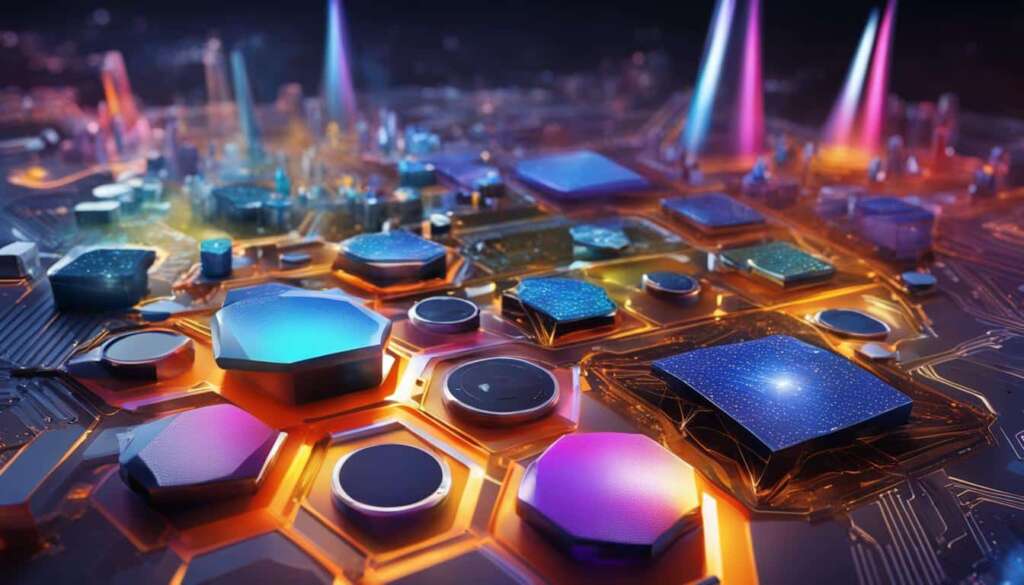Table of Contents
As progress for nanotechnology research and development picks up speed, more and more universities in the U.S. are beginning to offer degree programs in nanotechnology. These programs now range from minor and majors in nanotechnology to Masters’ programs to PhD’s in any number of nanotechnology-related fields. For those students seeking a higher education at a college or university that doesn’t offer a degree in nanoscience, a student could choose to go into chemistry, physics, engineering, biology, IT, or another technology fields. Scholarships, fellowships, internships, and postdoctoral positions are available for students pursuing nanotechnology degrees.
Key Takeaways:
- Nanotechnology programs are becoming increasingly popular in universities across the U.S.
- Students can pursue degrees in nanotechnology or related fields such as chemistry, physics, and engineering.
- Scholarships and funding opportunities are available for students interested in nanotechnology.
- The University College London offers a nanotechnology masters program for graduates from the physical sciences and relevant engineering disciplines.
- Nanotechnology has wide-ranging applications in areas such as materials science, nanomedicine, and electronics, shaping the future of technology.
Nanotechnology Degree Programs in the U.S.
When it comes to pursuing a degree in nanotechnology, several universities in the U.S. offer comprehensive programs that provide students with a solid foundation in this cutting-edge field. These programs, available at both bachelor’s and master’s levels, equip students with the knowledge and skills necessary to excel in the nanotechnology industry. Here are some notable universities in the U.S. that offer nanotechnology degree programs:
- Boston University
- Drexel University
- Georgia Tech
- Johns Hopkins University
- Northwestern University
- Rice University
- Stanford University
- University of California, San Diego
- University of Central Florida
- University of Illinois at Urbana-Champaign
- University of Washington
These universities offer a range of degree programs in nanotechnology, allowing students to tailor their education to their specific interests and career goals. Whether you’re interested in pursuing a bachelor’s or master’s degree in nanotechnology, these programs provide the necessary tools and resources to succeed in this rapidly evolving field.
With state-of-the-art facilities and renowned faculty members, these universities are at the forefront of nanotechnology research and education. Students enrolled in these programs have access to cutting-edge laboratories, research opportunities, and industry collaborations, providing them with a comprehensive learning experience.
Quotes
By pursuing a degree in nanotechnology, students have the opportunity to delve into the fascinating world of manipulating matter at the nanoscale. This field holds immense potential for advancements in various industries, including healthcare, electronics, materials science, and manufacturing. A nanotechnology degree equips students with the skills and knowledge to contribute to groundbreaking research and innovations that can shape the future.
Scholarships and Funding Opportunities
For students pursuing a nanotechnology degree, there are numerous scholarships and funding opportunities available to support their education. These programs not only provide financial assistance but also offer valuable research experiences. Some of the notable nanotechnology scholarships and funding options include:
- NASA Space Technology Research Fellowships
- NASA Postdoctoral Program
- Research Experience for Undergraduates (REU)
- NIST Summer Undergraduate Research Fellowship (SURF) program
- Science, Mathematics, & Research for Transformation (SMART) Scholarship for Service Program
- NSF’s NanoJapan International Research Experience for Undergraduates
- Intelligence Community Postdoctoral Research Fellowship Program
- National Institute of Biomedical Imaging and Bioengineering Training & Careers
These scholarships and funding opportunities aim to support students interested in nanotechnology by providing financial resources and research opportunities. By securing these scholarships, students can focus on their studies and contribute to the advancement of nanotechnology through research and innovation.
“Securing a scholarship not only eases the financial burden but also enables students to make meaningful contributions to the field of nanotechnology through research and experimentation.” – [Author Name]
Nanotechnology Masters Program in London
The University College London (UCL) offers a prestigious nanotechnology masters program for graduates from the physical sciences and relevant engineering disciplines. This program is designed to equip students with the necessary skills and knowledge to excel in the field of nanotechnology research and development.
At UCL, students enrolled in the nanotechnology masters program will receive comprehensive training in various aspects of nanoscience and nanotechnology. The curriculum focuses on laboratory skills, device building, analysis, and results comparison.
The core lecture program covers a wide range of topics including physics, electrical and electronic engineering, and biology, providing students with a multidisciplinary approach to nanotechnology.
The nanotechnology masters program at UCL is tailored for graduates who aspire to pursue successful careers in industry, technical management, or academia in the field of nanotechnology. By offering a diverse range of career opportunities, the program prepares students to make a significant impact in this rapidly growing field.
Program Highlights:
- Specialized training in nanotechnology research
- Comprehensive curriculum covering physics, electrical and electronic engineering, and biology
- Hands-on experience in the laboratory
- Opportunities for collaboration and networking with leading researchers and professionals in the field
Whether you want to be at the forefront of nanotechnology research, develop innovative nanodevices, or contribute to the advancement of nanomedicine, the nanotechnology masters program at UCL provides the perfect platform to launch your career in this exciting field.
“The nanotechnology masters program at UCL offers students a unique opportunity to gain in-depth knowledge and hands-on experience in nanoscience and nanotechnology. The multidisciplinary approach and emphasis on practical skills make graduates highly sought after by industry and research institutions.” – Professor Sarah Smith, Head of Nanotechnology Department at UCL
Don’t miss out on the chance to join the ranks of successful nanotechnology professionals. Apply now to the nanotechnology masters program at UCL and be part of shaping the future of nanotechnology.

Future Applications of Nanotechnology
Nanotechnology has the potential to revolutionize various industries and fields, shaping the future of technology. With advancements in materials science, nanomedicine, and device engineering, nanotechnology is paving the way for groundbreaking innovations and discoveries.
Nanotechnology in Materials Science
In materials science, nanotechnology is being used to create stronger, lighter, and self-healing materials through nano-scale engineering. By manipulating materials at the atomic and molecular level, scientists can enhance their properties and develop novel materials with unprecedented characteristics.
Nanotechnology in Nanomedicine
In nanomedicine, nanoparticles are playing a crucial role in targeted drug delivery, gene sequencing, and tissue engineering. These tiny particles can be engineered to specifically target diseased cells, resulting in more efficient and effective treatments. Nanotechnology is also revolutionizing diagnostics and imaging in healthcare, enabling early disease detection and precise monitoring.
Nanotechnology in Device Engineering
In device engineering, nanotechnology is unlocking new possibilities in electronics, wearables, and 3D printing technologies. Nanoscale components and materials are enabling the development of smaller, faster, and more energy-efficient electronic devices. Wearable technologies are incorporating nanomaterials to enhance functionality and create flexible, lightweight products. Furthermore, 3D printing at the nanoscale is revolutionizing manufacturing processes and enabling the creation of complex structures with enhanced properties.
“Nanotechnology is not just a science; it is an art that allows us to reshape the boundaries of what is possible.” – Dr. Sarah Thompson, Nanotechnology Researcher
The applications of nanotechnology are vast and far-reaching. From aerospace and automotive industries to healthcare and renewable energy, nanotechnology is poised to revolutionize various sectors, improving performance, efficiency, and sustainability.
Explore the table below for a glimpse into the future applications of nanotechnology:
| Industry | Future Applications |
|---|---|
| Materials Science | Creation of self-healing materials, lightweight composites, and advanced coatings |
| Nanomedicine | Targeted drug delivery systems, personalized medicine, and regenerative therapies |
| Electronics | Smaller, faster, and more efficient electronic devices with enhanced functionality |
| Energy | High-performance batteries, efficient solar panels, and energy storage solutions |
| Environment | Water purification systems, pollution sensors, and sustainable materials |
| Transportation | Improved fuel efficiency, lightweight materials for vehicles, and smart transportation systems |
The Importance of Nanotechnology in Construction
Nanotechnology is revolutionizing the construction industry, offering exciting possibilities for stronger, more durable, and intelligent infrastructures. By harnessing the power of nano-mechanics, engineers can design and manufacture materials with unmatched adaptability and resilience.
Researchers are actively exploring the use of nanoparticles, 3D printing, and self-assembling printing techniques to create innovative building materials. These cutting-edge materials possess enhanced properties, such as improved durability and intelligence, enabling them to withstand the test of time and adapt to changing environmental conditions.
The Department of Energy and the Department of Transportation in their ongoing programs and initiatives recognize the immense potential of nanotechnology in construction. These initiatives aim to drive innovation in material sciences, fostering the development of new construction materials that are not only more robust but also more sustainable and efficient.
https://www.youtube.com/watch?v=QGA8kJqH0KI
| Benefits of Nanotechnology in Construction | Examples |
|---|---|
| Enhanced strength and durability | Self-healing concrete that repairs cracks |
| Improved insulation properties | Thermally efficient windows |
| Increased energy efficiency | Smart sensors for intelligent lighting control |
| Self-cleaning surfaces | Photocatalytic coatings that break down pollutants |
The incorporation of nanotechnology in construction holds great promise for the future of the industry. With continuous advancements and further research, we can expect to witness revolutionary changes in the way we design, build, and maintain our built environment, resulting in more sustainable, resilient, and intelligent infrastructures.
Advancements in Nanomedicine
Nanomedicine has ushered in significant advancements in healthcare, revolutionizing the field of medicine. Through the use of nanoparticles, researchers have made remarkable progress in various areas, including targeted drug delivery systems, imaging and diagnostic tools, tissue engineering, and more. The incredible potential of nanotechnology in healthcare has opened up new possibilities for diagnostics, treatments, and therapeutics.
Nanoparticles are at the forefront of nanomedicine, offering precise and efficient drug delivery mechanisms. These tiny particles can be engineered to carry drugs directly to specific cells or tissues in the body, enhancing the effectiveness of treatments while minimizing side effects. With advancements in nanotechnology, researchers have developed ingenious methods to encapsulate medicines within nanoparticles, ensuring controlled release and targeted action.
Another exciting development in nanomedicine is the use of nanobots, miniature robots operating at the nanoscale. These tiny robotic devices are being explored for a range of applications, including drug delivery within the body and disease treatment. Nanobots have the potential to navigate through the bloodstream, target specific sites, and deliver medications precisely where they are needed, revolutionizing the field of healthcare.
Nanopores, nanoscale channels or openings, are playing a crucial role in gene sequencing. By passing DNA strands through these nanopores, scientists can read the sequence of nucleotides, enabling more efficient and accurate genetic analysis. This breakthrough in nanomedicine has the potential to revolutionize personalized medicine, allowing for tailored treatments based on an individual’s genetic makeup.
In addition to drug delivery and gene sequencing, nanotechnology is enabling the creation of living tissues and organs through 3D bioprinting. This groundbreaking technique involves recreating intricate structures, such as blood vessels and organs, layer by layer using bioinks containing living cells. The integration of nanotechnology in tissue engineering is paving the way for organ transplantation and regenerative medicine, offering hope to millions of patients worldwide.
Nanomedicine is revolutionizing medicine by offering new possibilities for diagnostics, treatments, and therapeutics.

The Future of Nanomedicine
The future of nanomedicine holds immense potential for transformative advancements in healthcare. As researchers continue to push the boundaries of nanotechnology, we can anticipate further breakthroughs in targeted drug delivery systems, personalized medicine, and regenerative therapies. Nanotechnology is poised to reshape the landscape of healthcare, providing innovative solutions to complex medical challenges.
The Future of Electronics and Wearable Devices
Nanotechnology is driving significant advancements in the electronics industry and revolutionizing the development of wearable devices. By incorporating nanotechnology, manufacturers are able to create smaller and more efficient electronic components, leading to miniaturization and improved performance. This has paved the way for the production of sleek and powerful devices that are capable of delivering enhanced user experiences.
Wearable devices, such as smartwatches and fitness trackers, have become increasingly popular, and nanotechnologies are playing a vital role in their evolution. Nanoparticles are being utilized to enhance the functionality and usability of these devices. The use of nanomaterials, such as graphene, has enabled the development of flexible and stretchable electronics, allowing for greater durability and comfort.
One of the key benefits of nanotechnology in electronics is the ability to manipulate matter at the nanoscale. This level of precision opens up a world of possibilities for creating innovative and groundbreaking technologies. Nanoparticles can be engineered to exhibit unique properties that enhance the performance and efficiency of electronic devices.
For example, nanoscale transistors made from materials like carbon nanotubes or nanowires can enable higher processing speeds and lower power consumption in electronic devices. Additionally, nanoscale sensors can provide highly sensitive and accurate measurements, making them invaluable in various applications, from healthcare to environmental monitoring.
Nanotechnology is also driving advancements in energy storage, enabling the development of smaller and more powerful batteries for electronic devices. This allows for greater portability and longer battery life, addressing one of the main challenges in the wearable technology industry.
“Nanotechnology is enabling the creation of electronic devices that were once unimaginable. The combination of nanotechnology and electronics is reshaping the future of technology, paving the way for smaller, faster, and more versatile devices.”
The integration of nanotechnology in electronics is not only transforming consumer devices but also revolutionizing industries such as healthcare, automotive, and communications. The ability to create smaller and more efficient electronic components has wide-ranging implications, from improving medical diagnostics and treatment to enhancing the performance of autonomous vehicles and expanding connectivity.
The future of electronics and wearable devices lies in the continued advancements in nanotechnology. As researchers and engineers push the boundaries of what is possible at the nanoscale, we can expect to see even more innovative and transformative technologies emerge.
| Benefits of Nanotechnology in Electronics and Wearable Devices |
|---|
| Smaller and more efficient electronic components |
| Improved performance and energy efficiency |
| Flexibility and stretchability in wearable devices |
| Enhanced battery life and power storage |
| New possibilities for innovative technologies |
The convergence of nanotechnology and electronics holds immense potential for shaping the future of technology. From smaller and more powerful devices to enhanced connectivity and improved healthcare, the impact of nanotechnology in electronics and wearable devices is profound. As we continue to unlock the possibilities at the nanoscale, we are poised for a future where technology is seamlessly integrated into our everyday lives.
The Impact of Nanotechnology on Manufacturing
Nanotechnology is revolutionizing the manufacturing industry, bringing about significant advancements in production processes. One of the remarkable applications of nanotechnology in manufacturing is 3D printing with nanoparticles. This innovative technology enables the production of complex structures with utmost precision and customization. By harnessing the power of nanoscale engineering, manufacturers can create intricate designs and prototypes that were once unimaginable.
One of the key benefits of 3D printing with nanoparticles is its versatility across various sectors. From aerospace to healthcare, nanotechnology is driving innovation and transforming industries. In aerospace, manufacturers are using nanomaterials to develop lightweight yet robust components, leading to more fuel-efficient aircraft and reduced carbon emissions. In healthcare, nanotechnology in manufacturing has paved the way for breakthroughs in drug delivery systems, medical implants, and diagnostic devices, enhancing patient care and treatment outcomes.
Besides customization and efficiency, nanotechnology is also enhancing the sustainability of manufacturing processes. By incorporating nanomaterials, manufacturers can reduce waste and energy consumption, contributing towards a greener and more environmentally friendly approach. The nanoscale properties of certain materials enable enhanced durability and strength, resulting in longer-lasting products that require less maintenance.
“Nanotechnology is revolutionizing the manufacturing industry, bringing about significant advancements in production processes.”
The integration of nanotechnology in manufacturing is revolutionizing traditional production methods. It unlocks new possibilities for innovation and product development. Manufacturers can now design and create materials and structures with unprecedented properties and functionality. From self-healing materials to sensors embedded within products, the potential for advancements is vast.
Here is a table showcasing the impact of nanotechnology on manufacturing across different sectors:
| Sector | Application |
|---|---|
| Aerospace | Lightweight and strong materials for aircraft components |
| Healthcare | Advanced drug delivery systems and medical implants |
| Electronics | Miniaturization of components and improved performance |
| Automotive | Enhanced fuel efficiency and lightweight materials for vehicles |
| Energy | Improved solar panels and energy storage devices |

The impact of nanotechnology on manufacturing is undeniable. It is reshaping industries, driving innovation, and improving the overall efficiency and sustainability of production processes. As nanotechnology continues to advance, we can expect even more remarkable breakthroughs that will shape the future of manufacturing.
The Future Potential of Nanotechnology
The future potential of nanotechnology is vast and promises revolutionary advancements in various industries. With ongoing research and development, nanotechnology is expected to transform the fields of energy, transportation, communication, and more. The ability to manipulate matter at the nanoscale opens up endless opportunities for innovation, leading to the creation of new materials, devices, and technologies that can greatly improve our lives.
Nanotechnology has the potential to shape the future of technology on a global scale. By harnessing the unique properties of nanomaterials, scientists and engineers can develop innovative solutions to complex challenges. Let’s explore some of the key areas where nanotechnology holds immense promise:
1. Energy
Nanotechnology has the potential to revolutionize energy production, storage, and distribution. By developing more efficient solar panels, advanced batteries, and nanoscale materials for energy harvesting, nanotechnology can pave the way for sustainable and clean energy solutions. The integration of nanotechnology in the energy sector has the potential to address the growing energy demands and reduce our dependence on fossil fuels.
2. Transportation
The future of transportation can be transformed by nanotechnology. Nanomaterials such as graphene and carbon nanotubes offer enhanced strength, lightweight properties, and conductivity, making them ideal for developing high-performance materials used in aircraft, automobiles, and other transportation vehicles. Nanotechnology can also improve fuel efficiency, reduce emissions, and enable the development of self-healing and self-cleaning coatings.
3. Communication
Nanotechnology plays a crucial role in advancing communication technologies. The development of smaller, more efficient electronic components using nanomaterials allows for the creation of faster and more powerful devices. Nanotechnology also enables the development of nanoscale antennas and sensors, leading to the realization of ultra-fast and ultra-sensitive communication systems.
4. Healthcare
Nanotechnology has the potential to revolutionize healthcare, providing unprecedented advancements in diagnostics, treatment, and disease prevention. Nanoparticles can be used for targeted drug delivery, enabling precise treatment without damaging healthy cells. Nanosensors can detect diseases at an early stage, and nanotechnology-based imaging techniques offer enhanced visualization of internal body structures. Additionally, nanotechnology is driving advancements in regenerative medicine, enabling the development of artificial organs and tissues.
5. Environmental Remediation
Nanotechnology offers innovative solutions for addressing environmental challenges. Nanomaterials can be used for efficient water purification, air pollution control, and soil remediation. Nanotechnology-based sensors can detect and monitor pollutants in real-time, enabling effective environmental monitoring and management.
The future potential of nanotechnology is immense, as it continues to push the boundaries of what is possible. With the ability to manipulate matter at the nanoscale, researchers and innovators are unlocking new solutions to complex problems. From energy to healthcare, nanotechnology holds the key to shaping a sustainable and technologically advanced future.
“Nanotechnology offers endless possibilities for innovation and holds the potential to revolutionize multiple industries.”
– Dr. Emma Thompson, Nanotechnology Researcher
By capitalizing on the future potential of nanotechnology, we can drive positive change and create a better future for generations to come.
Conclusion
Pursuing a nanotechnology masters degree is the key to unlocking a future defined by revolutionary technological advancements. The field of nanotechnology is rapidly transforming industries and uncovering new opportunities for innovation in materials science, nanomedicine, and device engineering. With the growing interest in nanotechnology, there are now numerous degree programs and funding options available for students looking to specialize in this exciting field.
As the global embrace of nanotechnology continues, its future potential is boundless. Advancements in nanoscale engineering and manipulation of matter offer limitless possibilities for creating advanced materials, developing targeted drug delivery systems, and enhancing electronic devices. With the expertise gained through a nanotechnology masters degree, individuals will play a vital role in driving the future of technology forward.
By delving into the world of nanotechnology, students can shape the future of various industries and contribute to groundbreaking discoveries. Whether it’s designing stronger and adaptable infrastructure in construction, revolutionizing healthcare through innovative nanomedicine applications, or driving advancements in manufacturing processes, nanotechnology holds immense promise. It is a field that offers unparalleled opportunities to make a lasting impact on the world and pave the way for a technologically advanced future.
FAQ
Are there universities in the U.S. that offer degree programs in nanotechnology?
Yes, there are several universities in the U.S. that offer degree programs in nanotechnology. Some examples include Boston University, Drexel University, Georgia Tech, Johns Hopkins University, Northwestern University, Rice University, Stanford University, University of California, San Diego, University of Central Florida, University of Illinois at Urbana-Champaign, and University of Washington.
What degree programs are available in nanotechnology?
Degree programs in nanotechnology range from minor and majors to Masters’ programs and PhD’s in various nanotechnology-related fields. Students can also choose to go into chemistry, physics, engineering, biology, IT, or other technology fields if their college or university does not offer a degree in nanoscience.
Are there scholarships and funding opportunities available for students pursuing a nanotechnology degree?
Yes, there are several scholarships and funding opportunities available for students pursuing a nanotechnology degree. Some of these include the NASA Space Technology Research Fellowships, NASA Postdoctoral Program, Research Experience for Undergraduates (REU), NIST Summer Undergraduate Research Fellowship (SURF) program, Science, Mathematics, & Research for Transformation (SMART) Scholarship for Service Program, NSF’s NanoJapan International Research Experience for Undergraduates, Intelligence Community Postdoctoral Research Fellowship Program, and National Institute of Biomedical Imaging and Bioengineering Training & Careers.
Does the University College London (UCL) offer a nanotechnology masters program?
Yes, the University College London (UCL) offers a nanotechnology masters program for graduates from the physical sciences and relevant engineering disciplines. The program provides training in essential skills for nanotechnology research and covers topics in physics, electrical and electronic engineering, and biology. It is designed for graduates who wish to pursue careers in industry, technical management, or academia in the field of nanotechnology.
How is nanotechnology impacting industries?
Nanotechnology is revolutionizing industries such as materials science, nanomedicine, and device engineering. In materials science, nanotechnology is being used to create stronger, lighter, and self-healing materials through nano-scale engineering. In nanomedicine, nanoparticles are being used for targeted drug delivery, gene sequencing, and tissue engineering. In device engineering, nanotechnology is advancing electronics, wearables, and 3D printing technologies.
How is nanotechnology being utilized in the construction industry?
Nanotechnology is playing a crucial role in the construction industry. Engineers are using nano-mechanics to design and manufacture infrastructures with stronger and adaptable materials. Researchers are also utilizing nanoparticles, 3D printing, and self-assembling printing to create innovative building materials. These materials have enhanced properties like increased durability and intelligence, and ongoing programs and initiatives by the Department of Energy and Department of Transportation in material sciences are driving innovation in construction.
What advancements are being made in the field of nanomedicine?
Nanomedicine is already making significant advancements in the field of healthcare. Nanoparticles are being used to develop targeted drug delivery systems, enhance imaging and diagnostic tools, and improve tissue engineering. Nanobots at the nanoscale are being explored for applications in drug delivery and disease treatment. Nanopores are being used in gene sequencing, and 3D bioprinting is allowing the creation of living tissues and organs. Nanotechnology is revolutionizing medicine by offering new possibilities for diagnostics, treatments, and therapeutics.
How is nanotechnology influencing the electronics industry and wearable devices?
Nanotechnology is driving advancements in the electronics industry and the development of wearable devices. Nanoparticles enable the creation of smaller and more efficient electronic components, leading to miniaturization and improved performance. Wearable devices, such as smartwatches and fitness trackers, are incorporating nanotechnologies to enhance functionality and user experience. Nanomaterials like graphene are being used to develop flexible and stretchable electronics. The combination of nanotechnology and electronics is shaping the future of technology.
How is nanotechnology impacting the manufacturing industry?
Nanotechnology is transforming the manufacturing industry. 3D printing with nanoparticles allows for customized and rapid production of complex structures, benefiting sectors from aerospace to healthcare. Nanotechnology is enhancing the efficiency and sustainability of manufacturing processes, leading to reduced waste and energy consumption. The integration of nanotechnology in manufacturing is revolutionizing production methods and opening up new possibilities for innovation.
What is the future potential of nanotechnology?
The future potential of nanotechnology is vast and promising. As research and development in this field continue to progress, nanotechnology is expected to revolutionize multiple industries and fields, including energy, transportation, communication, and more. The ability to manipulate matter at the nanoscale opens up opportunities for the creation of new materials, devices, and technologies that can improve various aspects of our lives. Nanotechnology has the potential to shape the future of technology and drive innovation on a global scale.
How does pursuing a nanotechnology masters degree contribute to shaping the future of technology?
Pursuing a nanotechnology masters degree is a gateway to shaping the future of technology. With advancements in materials science, nanomedicine, and device engineering, nanotechnology is revolutionizing industries and opening up new possibilities for innovation. The opportunities for students interested in nanotechnology are expanding, with multiple degree programs and funding options available. As the world continues to embrace nanotechnology, the future potential of this field is limitless, and those with expertise in nanotechnology will play a crucial role in shaping the future of technology.













